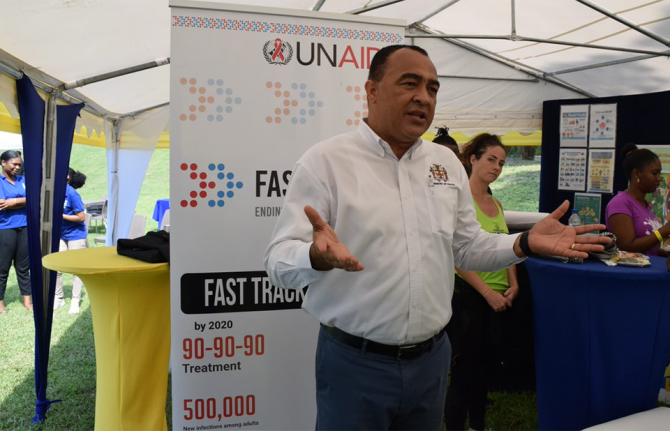

Feature Story
Ending stigma and discrimination is critical to expanding HIV services in Jamaica
04 December 2019
04 December 2019 04 December 2019In 2017, a Jamaican actress starred in an educational video about HIV treatment adherence. It was an upbeat, innocuous reminder to people living with the virus to eat healthily, exercise and take their medicine every day.
After she made the film, the young woman faced some strong reactions—bookings dried up, strangers in the street pointed at her and her daughter faced teasing at school. Although she herself is HIV-negative, it was a sharp reminder concerning the stigma and discrimination faced by people living with HIV.
Earlier in 2019, Jamaica’s Minister of Health, Christopher Tufton, appeared in a public service announcement with the young actress to tell people that a person’s HIV status was no reason to discriminate against them. “There is still a lot of work to be done and while I was disappointed by the reactions to the video, I have seen and heard enough to understand that HIV-related stigma and discrimination is still a big challenge in the community and something we have to work on,” he said.
Jamaica’s 2017 HIV/AIDS Knowledge, Attitudes, Behavior and Practice survey found that just 12% of respondents were accepting of people living with HIV. Over the years, Mr Tufton has had his own journey from fear to acceptance.
He was a teenager in Manchester, United Kingdom, when the first HIV cases were diagnosed in Jamaica during the early 1980s. During the decade that followed, as a post-graduate student in the United States of America and the United Kingdom, he heard how advances in the scientific and social response to HIV were creating new pathways toward prevention and stigma reduction. He describes his current spell as Minister of Health as “peak awareness.”
“Over time, I have evolved from fear to actively advocating for greater levels of tolerance. I’ve been more interactive with people affected by HIV and with vulnerable groups. I have become an advocate both for anti-discrimination and for prevention. HIV does not have to be a death sentence. It can be treated. It can be controlled. If you take your medicines you can live a long and fruitful life,” says Mr Tufton.
Thousands of Jamaicans living with HIV are still not accessing treatment. As it updates its National Strategic Plan, the Ministry of Health and its partners are focused on addressing the challenges around connecting people to care and keeping them on treatment. For example, they are working to increase testing and outreach to men. Men are far more likely than women to be diagnosed late and to die from AIDS-related illnesses.
Having drawn the connection between relatively low levels of treatment coverage and discriminatory public attitudes, the government has boosted efforts to change hearts, minds and behaviours. Health-care discrimination is monitored through the Client Complaint Mechanism, as well as the Jamaica Anti-Discrimination System managed by the Jamaica Network of Seropostives. The Ministry of Health is also deploying strategies to reduce stigma and discrimination by training health-care workers, engaging with the faith community and running additional campaigns aimed at the general public.
These efforts come as the country prepares to transition away from a substantial degree of international funding for the AIDS response to greater national ownership. Along with its
commitment to provide free HIV treatment for all who need it in 40 facilities across the country, the government will also ensure that vulnerable communities currently served by donor programmes are included in domestic budgetary planning.
Partnering with civil society is a critical strategy for ensuring that the most stigmatized groups—people living with HIV, transgender people, gay men and other men who have sex with men and sex workers—are able to successfully access treatment.
“Civil society organizations are key partners. As part of the process we will identify which groups are best suited to deliver services. There are government systems in place for engaging with service providers,” says Mr Tufton.
The UNAIDS Country Director, Manoela Manova, welcomes this commitment to working with civil society to address prejudice and increase access to services.
“Jamaica has done a good job at HIV testing,” says Ms Manova. “Now new strategies are needed to reach those who are not aware of their status and to connect people diagnosed with HIV with treatment. The more we do to ensure that people feel safe and respected, the closer the country will come to ending AIDS.”



